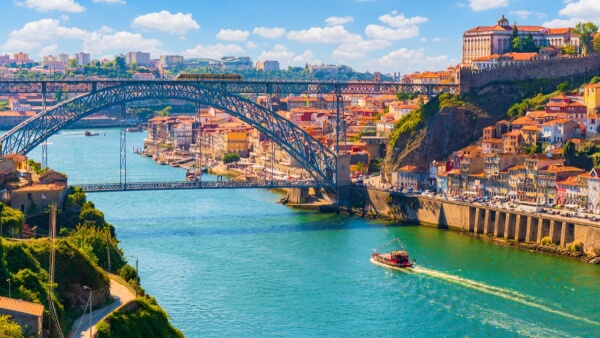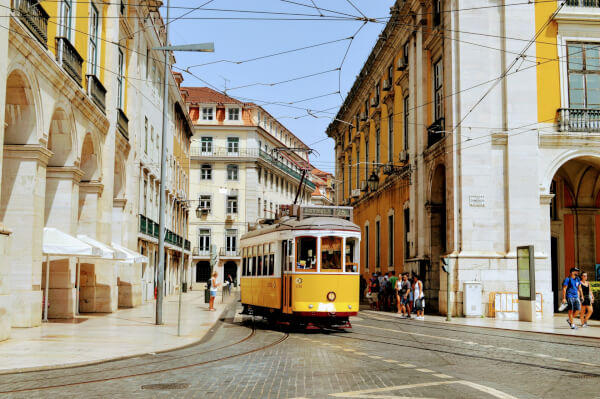Portugal tourist tax: What you need to know in 2025
Travelling to Portugal soon? Find out everything about the tourist tax in Portugal and essential travel tips.

Key takeaways:
Maybe you’re jetting off to Lisbon for a culture-packed city break, sipping wine along the Douro River, or kicking back on the black sand beaches of Madeira. Whatever your destination, this guide is here to help you have a safe and memorable trip to Portugal. We’ll lay out the key info on visa and entry requirements, health and safety essentials, laws and currency, money and customs and much more.
We’ll also show you a convenient and cost-effective way to spend in Portugal – the Wise debit card. It’s designed for low-cost spending in 150+ countries. This clever international debit card automatically converts your pounds to Euros whenever and wherever you spend, for low, transparent fees* and mid-market exchange rates.
Learn more about the Wise debit card 💳
Before you travel to Portugal from the UK, you’ll need to know about the country’s entry requirements for UK nationals.
Luckily, as with all Schengen Zone countries, you won’t need to apply for a visa in advance, and can stay in Portugal up to 90 days within a 180-day period. That means that you’ll need to keep evidence of when you arrived, whether that’s a stamp in your passport or printed out plane tickets.
This 90-day window applies not only to visits for tourism purposes, but also visiting friends and family, attending business meetings, cultural or sports events or short term studies or training.
Under the Schengen Area Rules, your passport will also need to have a ‘date of issue’ less than 10 years before the date you arrive. It should also have an ‘expiry date’ of at least three months after you plan to leave the Schengen Area.
Border control agents might also ask you to show a return or onward ticket as well as proof of travel insurance or that you have enough money for your visit.
Portugal is consistently ranked as one of the safest countries in Europe, not to mention the world.2 However, you’ll still need to take some common sense precautions.
Crime rates are low, but especially in areas with a lot of tourists, bag snatching and theft from holiday properties are common.
Make sure that you lock all doors and windows at your accommodation to stay secure.
Drink spiking isn’t common but it does occur so keep an eye on whatever you order. Also, know your limits, as drinks in Portugal tend to be stronger than those in the UK.
There is also a risk of pickpocketing on public transport, so be sure to keep an eye on your belongings, especially at crowded bus and tram stops.
The UK’s Foreign, Commonwealth & Development Office lists more safety precautions in Portugal to look out for, including region-specific advice.3

All around Portugal, you’ll be able to pay with Euros (€). You can either exchange your British pounds directly, take money out of an ATM, pay with a debit or credit card or use mobile payment options such as Apple Pay.
You can change your British pounds for Euros in the UK, or when you arrive in Portugal. Just make sure to get the best exchange rate by watching out for added fees/commission, which can be steep at airports or hotels.
Spending on a debit or credit card is also an option. Portugal has plenty of ATMs, especially in larger cities and the centres of smaller towns and villages. The main ATM network is called Multibanco, and you’ll find plenty of them at train stations, in shopping centres and at bank branches. Other ATMs can be found under the name Caixa Automático.4* *
Many UK credit cards charge a transaction fee of around 2.75 to 2.99 percent for purchases made in foreign currencies.5
Avoid getting hit with high fees and poor exchange rates at airports and other exchange houses by using the Wise debit card. You’ll then be able to spend in 40+ currencies by automatically converting your pounds at the mid-market exchange rate, only adding a tiny currency conversion fee* – or it’s free if you already have the local currency in your Wise account.
Cash is still king in Portugal, though cards are widely accepted, especially in larger cities.
You’ll be able to use your UK contactless card, and in Lisbon can even pay for your metro ride by tapping it.
Many businesses in large cities will also accept mobile payment options such as Apple and Google Pay. Portugal’s own MB Way is the most popular form of mobile payment in the country, though you’ll need an account with the Portuguese MB Way in order to use it.5
Multibanco ATMs don’t have any fees to use them. Privately operated ATMs such as Euronet can come with a fixed surcharge of up to €3–€7 per withdrawal.4
There are over 1,000 flights departing every week from the UK to Portugal. The costs will vary quite a bit, however, depending on the route you take, whether you travel during the high season and your airline. Many budget airlines such as Wizz Air UK, easyJet and RyanAir offer direct flights to Portugal from major cities in the UK.
Flight Bookings website Skyscanner lists September as the cheapest month to travel from the UK to Portugal.6
A Friday to Friday flight from London Stansted (STN) to Faro in southern Portugal — a common budget airline route — will cost around £88 when you fly slightly off season.
A flight departing at the same time and location to Lisbon will cost around £180 roundtrip.
Costs can also vary a bit once you’re in Portugal. We broke down the average costs of accommodation at a mid-range hotel, dinner for two and a one-way public transport ticket at three major cities in south (Faro), central (Lisbon) and northern (Porto) Portugal in GBP.7
| Category | Lisbon | Porto | Faro (Algarve) |
|---|---|---|---|
| Accomodation at mid-range hotel | £94 | £67 | £63 |
| Dinner for 2 | £46 | £43 | £38 |
| Public Transport (one-way ticket) | £1.28 | £1.28 | £1.28 |
| Main Sights | Belém Tower, Jerónimos Monastery, Tram 28, Alfama District | Ribeira district, Livraria Lello, Douro Riverfront | Old Town, Ria Formosa, beaches |
Portugal is generally an affordable destination for travellers from the UK, but your daily expenditures can quickly add up if you’re not aware of some smaller costs.
| 🇵🇹 Read more: Portugal tourist tax - How much is it? |
|---|
As a guest in Portugal, here are some of the customs and laws you’ll need to know to have a safe and respectful visit.
If you experience an emergency situation during your trip, these are the numbers to call:
All of these numbers operate 24/7, seven days a week.11
Be sure to keep the contact of your travel insurance provider handy in case you need to make a claim or require assistance.
Open a Wise account online and you can order the Wise debit card for a one-time fee of £7. You can use this clever card in 150+ countries, including Portugal.
It automatically converts your pounds to local currency whenever you spend using the mid-market exchange rate, only adding a tiny, transparent conversion fee* – or it’s free if you already have the local currency in your Wise account.
Here are some of the top questions:
After Brexit, UK phone carriers were no longer required to offer roaming services for free in the EU. Many still do up to a certain amount of data or roaming plan, however. O2 for example offers free EU roaming for up to 25 GB per month12 whereas Vodafone UK gives you the option to pay around £2 extra per day.13 Alternatively you can get an eSim card to avoid roaming charges.
In order to use your electronics in Portugal, you’ll need a Type C/F adapter for power plugs and sockets, which are suitable for the standard voltage of 230 v at a frequency of 50 Hz.14
While UK residents are not legally required to have travel insurance for Portugal, taking out a policy is still highly recommended. Your GHIC (Global Health Insurance Card) grants access to state-provided healthcare in Portugal but still doesn’t cover private medical treatment, emergency repatriation to the UK or trip cancellations, lost baggage or delays.15
Sources used:
Sources last checked on 23-Sept-2025.
*Please see terms of use and product availability for your region or visit Wise fees and pricing for the most up to date pricing and fee information.
This publication is provided for general information purposes and does not constitute legal, tax or other professional advice from Wise Payments Limited or its subsidiaries and its affiliates, and it is not intended as a substitute for obtaining advice from a financial advisor or any other professional.
We make no representations, warranties or guarantees, whether expressed or implied, that the content in the publication is accurate, complete or up to date.

Travelling to Portugal soon? Find out everything about the tourist tax in Portugal and essential travel tips.

What’s the best way to buy train tickets in Portugal? A handy guide including step-by-step instructions and FAQs.

The VAT refund system in Portugal allows tourists to claim back the tax paid on goods purchased. This guide will show you how to shop tax free in Lisbon.

Should you pay by cash or card in Portugal? A handy guide including cash etiquette, Portuguese ATMs and using your UK card.

Looking for an ATM in Portugal? Read our guide for info on where to find them, fees, exchange rates, withdrawal limits and more.

Portugal saw an increase in tourism of 10% in 2015, with 10.18 million foreign visitors. In fact last year was the best ever year for tourism in Portugal with...